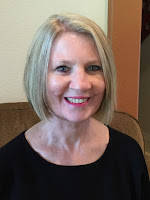Would You Have Been Colorblind?
 Today I'm delighted to welcome Leah Harper Bowron, author of the novel Colorblind, to my blog - a novel of the recent past with a powerful message for present-day middle-grade students.
Today I'm delighted to welcome Leah Harper Bowron, author of the novel Colorblind, to my blog - a novel of the recent past with a powerful message for present-day middle-grade students.Colorblind is set in 1968. In Montgomery, Alabama.,Dr. Martin Luther King, Jr. and Sen. Bobby Kennedy have been assassinated. War is raging in Vietnam, and on the playground of the all-white Wyatt Elementary School. Schoolyard bullies tease sixth grader Lisa Parker because of the way her nose looks. Lisa frequently develops a stomachache and checsk out of school to escape the bullies, until sixth grade teacher Miss Annie Loomis came to Wyatt. Miss Loomis just happens to be the first African American at Wyatt, and Lisa loves her English class. Now, when the bullies tease Lisa, she stays in school so that she can be in Miss Loomis’ class. Then something terrible happens that will change Lisa and Miss Loomis forever. Racism rears its ugly head at Wyatt, and now Lisa is not the only victim of the bullies’ teasing. Will Miss Loomis endure the bullies’ racist taunts?
 Find Colorblind on Amazon at https://www.amazon.com/Colorblind-Novel-Leah-Harper-Bowron-ebook/dp/B071JNGJSD/
Find Colorblind on Amazon at https://www.amazon.com/Colorblind-Novel-Leah-Harper-Bowron-ebook/dp/B071JNGJSD/Now meet the author:
Colorblind is based off your sixth grade
experience when your school became integrated. How much of this novel depicts
your actual experience?
This novel depicts half of my
actual experience and half of fictionalization for dramatic effect. For example, there was an actual spelling bee
at my school, but Miss Loomis’ reaction thereto was exaggerated for dramatic
effect.
You were
inspired by Harper Lee’s To Kill a
Mockingbird. How did this novel influence your writing?
This novel inspired me to write
about racism from the point of view of a Caucasian Southern girl.
How much research, if any, did you dedicate
to the novel?
I researched the dates of Dr. King
and Sen. Kennedy’s assassinations as well as the date of the Apollo moon
launch.
How would you describe the characters Ms.
Loomis and Lisa Parker apart from their physical appearances?
Miss Loomis and Lisa Parker were
both scared individuals who were bullied by two boys at school. Lisa was also browbeat by her mother while
Miss Loomis was browbeat by Rev. Reed.
Both characters had yet to realize their inner strengths. Lisa would grow to recognize her inner
strength while Miss Loomis would fall prey to the bullying and quit teaching at
Lisa’s school.
What role do you think skin color and birth
defects play in society today?
Skin color and birth defects both
define our individuality and discriminate based upon these genetic differences. Are they as relevant as they were back in
1968? Yes. Unfortunately, people still discriminate
against others based upon skin color and birth defects. I prefer the phrase “physically challenged”
to that of “birth defects.” The latter
phrase implies that the person is somehow less than a complete human
being.
How did you develop the characterization
for the bullies?
I used the physical descriptions of
my actual schoolyard bullies for the two bullies in Colorblind.
How did you develop the resolution for the
novel?
I took what actually happened after
my spelling bee—my African American teacher quit teaching school—and changed it
by having her teach HeadStart children to demonstrate her resilience in the
face of discrimination. Yet her
resilience is short-lived because she dies at the end of the book, an aspect of
the book which I fictionalized for dramatic effect.
What was the most rewarding moment you
experienced in writing Colorblind?
My most rewarding moment was
re-living my bicycle ride with my brother to Katie’s candy store—this happy
event actually happened many times during my childhood.
What was the biggest challenge you faced
writing Colorblind?
My biggest challenge was being a
Caucasian Southern woman writing about an African American Southern woman. I developed a “second skin” which enabled me
to write as Miss Loomis, Lisa’s African American sixth grade teacher.
What do you hope readers will gain from
Colorblind?
I hope that my readers will gain
insight into the evils of discrimination based upon skin color or physical
challenge. I hope my readers will also
realize that discrimination is an ongoing problem which requires vigilance not
only in 1968 but also today.
What did you gain from writing Colorblind?
I gained cathartic healing from
writing Colorblind as I relived my
childhood bullying.
Comments